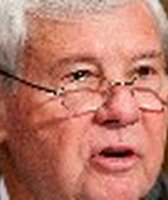Stand up for the facts!
Our only agenda is to publish the truth so you can be an informed participant in democracy.
We need your help.
I would like to contribute
Former U.S. Sen. Bob Graham's claim that Saudi Arabia created al-Qaida lacks nuance
Controversy is swirling over 28 pages from the congressional report on the 9/11 terror attacks that have been kept hidden from the public. There is a suspicion that they implicate Saudi Arabia, a United States ally in the Middle East. The Saudis have, for years, vigorously denied any involvement in the 2001 attacks on the World Trade Center towers and the Pentagon.
Former U.S. Sen. Bob Graham, D-Fla., co-chaired the Senate Intelligence Committee that helped write the report and has pushed for release of all the documents looking at Saudi involvement in the attacks. Sunday on Meet the Press, moderator Chuck Todd asked why United States and Saudi officials don't want the information released.
"To me, the most important unanswered question of 9/11 is, did these 19 people conduct this very sophisticated plot alone, or were they supported?" Graham said. "I think it's implausible to think that people who couldn't speak English, had never been in the United States before, (and) as a group were not well-educated could have done that. So who was the most likely entity to have provided them that support? And I think all the evidence points to Saudi Arabia. We know that Saudi Arabia started al-Qaida. It was a creation of Saudi Arabia."
We wondered if, in fact, it was Saudi Arabia that created al-Qaida, the organization led by Osama bin Laden that engineered the attacks.
Origin stories
The terrorist group's origins can be traced to Afghanistan, where the Soviet Union waged a long and ultimately fruitless war from 1979 to 1989.
It was the era of the Cold War, and the United States backed the Muslim insurgents who were fighting the Soviets. The Afghan freedom fighters were also getting backing from fellow Muslims in Saudi Arabia and other Persian Gulf countries.
One person giving money was bin Laden, the son of a wealthy construction magnate. But he also helped establish what was known as the "Golden Chain," a group of Arab donors who gave millions for the cause.
The money went to something known as the Services Office, which was run by bin Laden and a Palestinian religious scholar name Abdullah Azzam. The office recruited, trained and equipped thousands of foreign "holy warriors," known as mujahideen, from more than 50 countries.
Their training camp was known as "the base," which translates to al-Qaida.
In 1988, when the war against the Soviets was winding down, there was a meeting in Pakistan where al-Qaida was formed. Bin Laden wanted to take the fight of jihad to other countries, driving out the corrupting influence of Western countries and replace it with fundamentalist Islam.
Bin Laden moved to Saudi Arabia. In 1990, after Iraq President Saddam Hussein invaded neighboring Kuwait, Saudi Arabia's rulers felt vulnerable and asked the United States to intervene.
That upset bin Laden.
"Bin Laden viewed this development as an unbearable humiliation for all Muslims — the land of the Prophet defiled by infidels," said Philippe Migaux, writing in The History of Terrorism.
He offered his mujahideen fighters to help defend the country, but the offer was rejected. He then issued a fatwa, or religious edict, that denounced the ruling House of Saud, calling it corrupt.
The Saudi government expelled him in 1991, ultimately stripping him of Saudi citizenship in 1994. He ended up in Sudan, where he operated al-Qaida and coordinated terrorist attacks.
Sudan expelled him on May 18, 1996 — but not before he took millions with him raised from his Golden Chain — and he went to Afghanistan, which had just been taken over by the Taliban, a fundamentalist Muslim group. He was in Afghanistan when the 9/11 attacks were launched.
A question of financing
So did Saudi Arabia start al-Qaida?
Clearly Saudi money was directly invested to get the Soviets out of Afghanistan. But once that goal was accomplished and al-Qaida became an entity, the funding became less direct.
Daniel Byman, research director at the Center for Middle East Policy at the Brookings Institution, said in a email, "Osama bin Laden's personal wealth mattered tremendously when the group was formed in 1988. In a way this wealth was ‘Saudi’ in that his family was a Saudi family, but it's different than the Saudi state or Saudi organizations."
"Over time," Byman said, "Bin Laden lost his money and/or the Saudi government froze it. A network of wealthy donors, many from the Gulf states (including but not limited to Saudi Arabia) became vital to al-Qaida funding (and easily eclipsed Bin Laden's personal wealth)."
Daveed Gartenstein-Ross, a senior fellow at the Foundation for Defense of Democracies, said, "It's not as though everyone in the government supported funding al-Qaida."
But there was so much Saudi-based support from individual Saudis and organizations that directed money from the Saudi government that the statement should be considered true, Gartenstein-Ross said, even if Graham's statement "is a bit under-nuanced."
"He's talking about Saudi financiers. He's not claiming the state itself is a major supporter for al-Qaeda," he said. "Government-sponsored charities were doing it, and the government had to be aware it was going on."
"It's clear you had government money that went through these charities," he said. "And while you could talk about lack of oversight for these charities, which used to be the line the government used, mere lack of oversight doesn't fully explain the government's position."
It would be more accurate to say that the terrorist organization was created, Gartenstein-Ross said, by "Saudi financiers including organizations financed by the government that don't represent official government policy."
Graham directed us to a 2003 Wall Street Journal article that reported "some of Saudi Arabia's richest and most influential families as among the first financial supporters of Osama bin Laden." However, as the article notes, that support came as bin Laden was transitioning away from fighting the Soviets. The families involved have denied funding the al-Qaida-involved terrorist attacks.
Graham harked back to his comment on Meet the Press when Todd asked about the distinction between the government and wealthy individuals who happen to be Saudi Arabian.
"That is a very murky line. Saudi Arabia has made it murky by its own legal action," Graham said. "Whenever a U.S. group sues a Saudi Arabian entity, whether it’s a bank, a foundation, a charity, immediately, the defense of sovereign immunity is raised. The Saudis don't recognize the difference between a royal decision and a societal decision in the same way that other countries might."
Our ruling
Graham said, "We know that Saudi Arabia started al-Qaida."
Al-Qaida was started in an effort, largely backed by Saudi Arabia, to force the Soviet Union out of Afghanistan.
The government did not, strictly speaking, create the organization. It was the product of jihadists wanting to continue the fight after the Soviets left, using the funds of Saudi backers to do it.
It prospered because of donations from Saudi interests, including groups tied to the government. The Saudis deserve significant responsibility for its existence. But Graham's phrasing could leave people believing the Saudi government itself created the terrorist organization.
The truth is fuzzier, and the caveats are important. So we rate the statement Half True.
https://www.sharethefacts.co/share/c651dc1e-3467-4404-96a7-78286af7f362
Our Sources
Council on Foreign Relations, "Backgrounder: al-Qaeda (a.k.a. al-Qaida, al-Qu'ida)," June 6, 2012
Email, Daniel Byman, research director, Center for Middle East Policy, The Brookings Institution, April 24, 2016
Interview, Daveed Gartenstein-Ross, senior fellow, Foundation for Defense of Democracies, April 24, 2016
The Guardian, "A history of terror: Al-Qaeda 1988," July 12, 2008
BBC News, "Al-Qaeda's origins and links," July 20, 2004
Foreign Policy, "Al Qaeda Core: A Short History," March 17, 2014
PBS, "Brief History of al Qaeda," accessed April 24, 2016
Washington Post, "U.S. Was Foiled Multiple Times in Efforts To Capture Bin Laden or Have Him Killed," Oct. 3, 2001
Osama Bin Laden: A Biography by Thomas R. Mockaitis
The History of Terrorism — From Antiquity to Al Qaeda, edited by Gerard Chaliand and Ganaud Blin, Al Qaeda chapter by Philippe Migaux
The Wall Street Journal, "List of Early al-Qaeda Donors Points to Saudi Elite Charities," March 18, 2003
Florida Bulldog, "9/11 victims: Saudi Arabia's 'lavish sponsorship' of al Qaeda made attacks possible," Sept. 24, 2014 and "Bob Graham questions decision to send Guantanamo detainees to Saudi Arabia for rehab," April 22, 2016
Tampa Bay Times, "Why did the FBI detail Bob Graham?" Aug. 7, 2015 and "Bob Graham's push for disclosure on Saudi Arabia and 9/11 enters prez campaign in NH," Aug. 12, 2015
CNN.com, "Transcript of Bin Laden's October interview," Feb. 5, 2002
Browse the Truth-O-Meter
More by C. Eugene Emery Jr.
Former U.S. Sen. Bob Graham's claim that Saudi Arabia created al-Qaida lacks nuance
Support independent fact-checking.
Become a member!
In a world of wild talk and fake news, help us stand up for the facts.




































